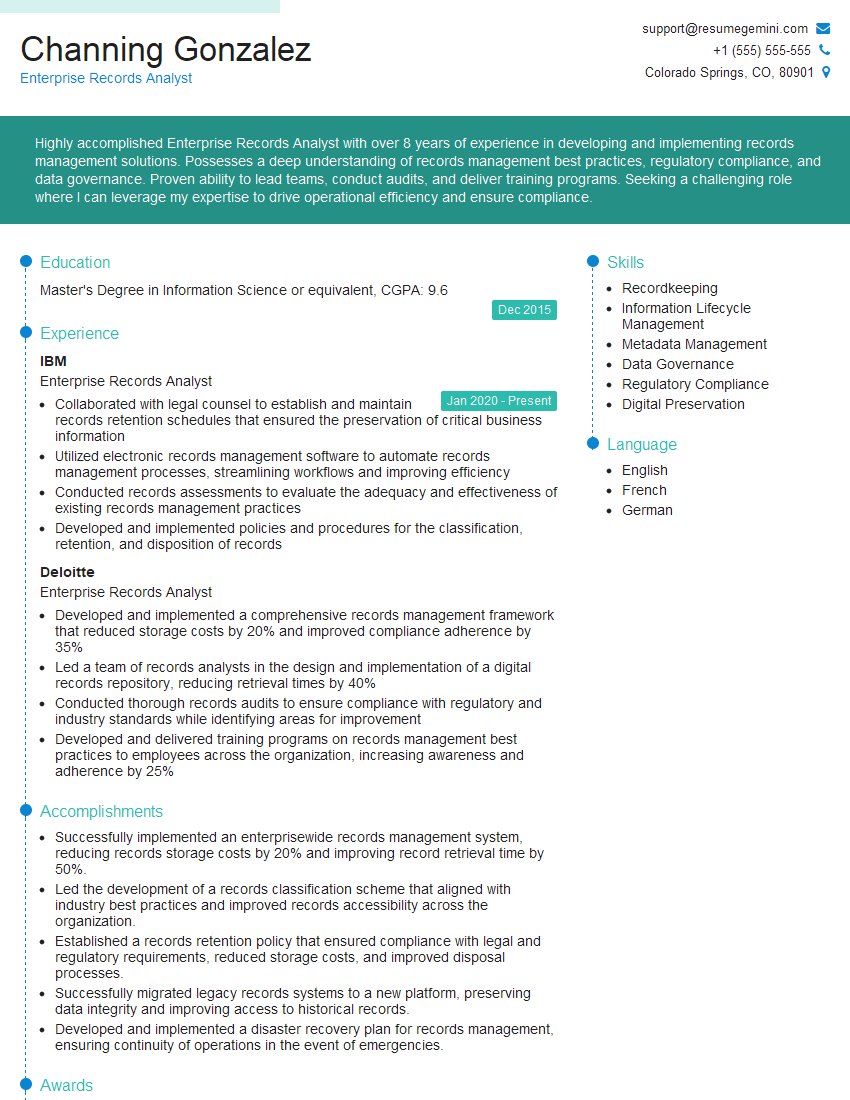Are you a seasoned Enterprise Records Analyst seeking a new career path? Discover our professionally built Enterprise Records Analyst Resume Template. This time-saving tool provides a solid foundation for your job search. Simply click “Edit Resume” to customize it with your unique experiences and achievements. Customize fonts and colors to match your personal style and increase your chances of landing your dream job. Explore more Resume Templates for additional options.

Channing Gonzalez
Enterprise Records Analyst
Summary
Highly accomplished Enterprise Records Analyst with over 8 years of experience in developing and implementing records management solutions. Possesses a deep understanding of records management best practices, regulatory compliance, and data governance. Proven ability to lead teams, conduct audits, and deliver training programs. Seeking a challenging role where I can leverage my expertise to drive operational efficiency and ensure compliance.
Education
Master’s Degree in Information Science or equivalent
December 2015
Skills
- Recordkeeping
- Information Lifecycle Management
- Metadata Management
- Data Governance
- Regulatory Compliance
- Digital Preservation
Work Experience
Enterprise Records Analyst
- Collaborated with legal counsel to establish and maintain records retention schedules that ensured the preservation of critical business information
- Utilized electronic records management software to automate records management processes, streamlining workflows and improving efficiency
- Conducted records assessments to evaluate the adequacy and effectiveness of existing records management practices
- Developed and implemented policies and procedures for the classification, retention, and disposition of records
Enterprise Records Analyst
- Developed and implemented a comprehensive records management framework that reduced storage costs by 20% and improved compliance adherence by 35%
- Led a team of records analysts in the design and implementation of a digital records repository, reducing retrieval times by 40%
- Conducted thorough records audits to ensure compliance with regulatory and industry standards while identifying areas for improvement
- Developed and delivered training programs on records management best practices to employees across the organization, increasing awareness and adherence by 25%
Accomplishments
- Successfully implemented an enterprisewide records management system, reducing records storage costs by 20% and improving record retrieval time by 50%.
- Led the development of a records classification scheme that aligned with industry best practices and improved records accessibility across the organization.
- Established a records retention policy that ensured compliance with legal and regulatory requirements, reduced storage costs, and improved disposal processes.
- Successfully migrated legacy records systems to a new platform, preserving data integrity and improving access to historical records.
- Developed and implemented a disaster recovery plan for records management, ensuring continuity of operations in the event of emergencies.
Awards
- Recognized with the Records Management Excellence Award for developing and implementing a comprehensive records lifecycle management program.
- Received the Innovation in Records Management Award for developing a blockchainbased records audit solution.
- Honored with the Records Champion Award for contributions to the field of records management and promoting best practices.
- Recognized for outstanding contributions to the Society for Records Management (SRM) as a member of the Board of Directors.
Certificates
- Certified Records Analyst (CRA)
- Registered Records Manager (RRM)
- Certified Information Governance Professional (CIGP)
- Certified Information Professional (CIP)
Career Expert Tips:
- Select the ideal resume template to showcase your professional experience effectively.
- Master the art of resume writing to highlight your unique qualifications and achievements.
- Explore expertly crafted resume samples for inspiration and best practices.
- Build your best resume for free this new year with ResumeGemini. Enjoy exclusive discounts on ATS optimized resume templates.
How To Write Resume For Enterprise Records Analyst
- Quantify your accomplishments using specific metrics whenever possible.
- Highlight your knowledge of industry-specific regulations and standards.
- Emphasize your ability to collaborate with cross-functional teams.
- Showcase your project management and leadership skills.
Essential Experience Highlights for a Strong Enterprise Records Analyst Resume
- Developed and implemented a comprehensive records management framework that reduced storage costs by 20% and improved compliance adherence by 35%.
- Led a team of records analysts in the design and implementation of a digital records repository, reducing retrieval times by 40%.
- Conducted thorough records audits to ensure compliance with regulatory and industry standards while identifying areas for improvement.
- Developed and delivered training programs on records management best practices to employees across the organization, increasing awareness and adherence by 25%.
- Collaborated with legal counsel to establish and maintain records retention schedules that ensured the preservation of critical business information.
- Utilized electronic records management software to automate records management processes, streamlining workflows and improving efficiency.
Frequently Asked Questions (FAQ’s) For Enterprise Records Analyst
What is the role of an Enterprise Records Analyst?
An Enterprise Records Analyst is responsible for developing and implementing records management policies and procedures, ensuring compliance with regulatory and industry standards, and managing the organization’s records.
What are the key skills required for an Enterprise Records Analyst?
Key skills include records management, information lifecycle management, metadata management, data governance, regulatory compliance, and digital preservation.
What are the career prospects for an Enterprise Records Analyst?
Enterprise Records Analysts can advance to roles such as Records Manager, Information Governance Manager, and Chief Records Officer.
What is the salary range for an Enterprise Records Analyst?
The salary range for an Enterprise Records Analyst varies depending on experience and location, but typically falls between $60,000 and $100,000 per year.
What are the educational requirements for an Enterprise Records Analyst?
Most Enterprise Records Analysts hold a bachelor’s or master’s degree in information science, library science, or a related field.